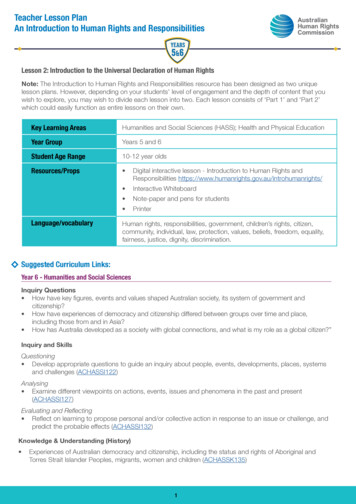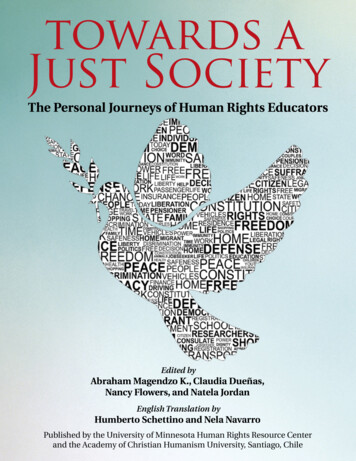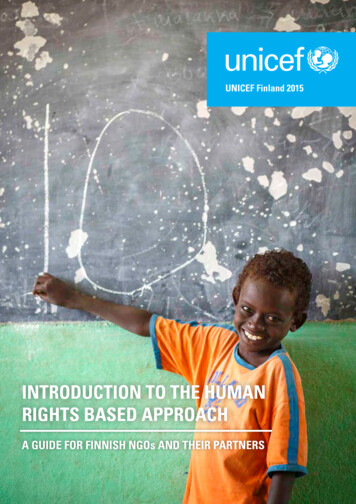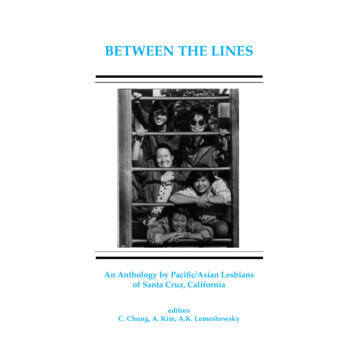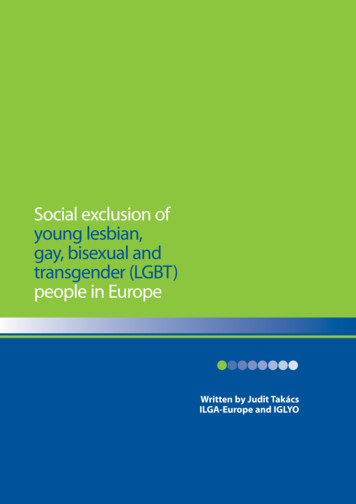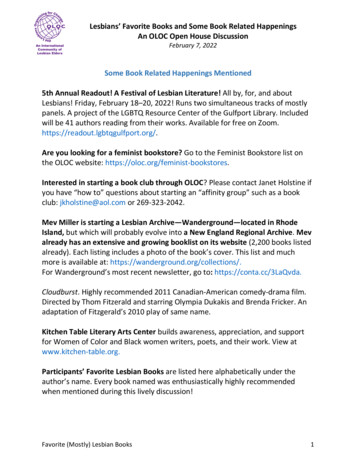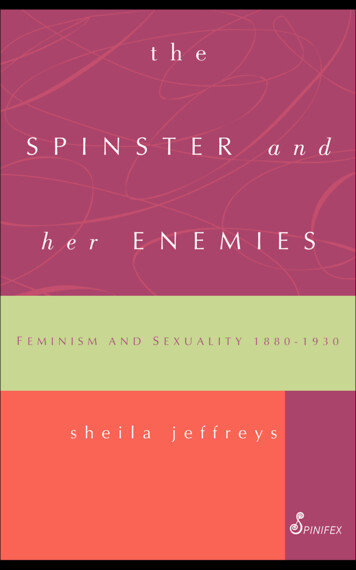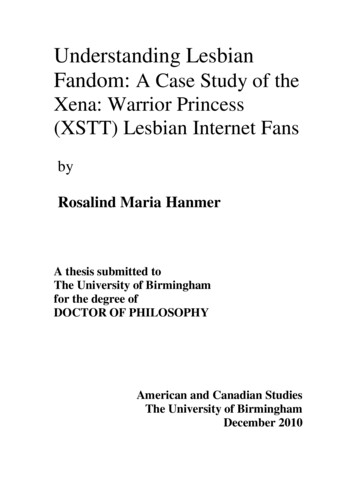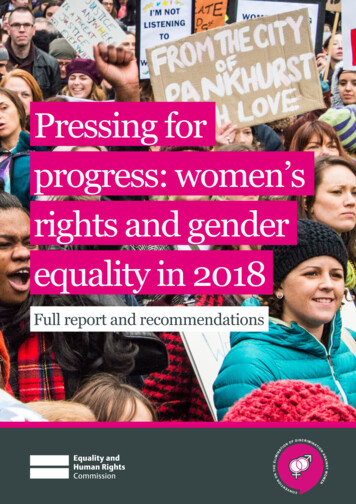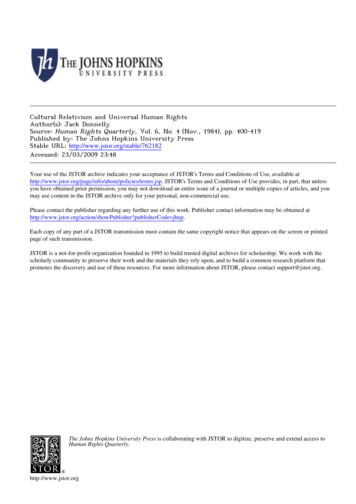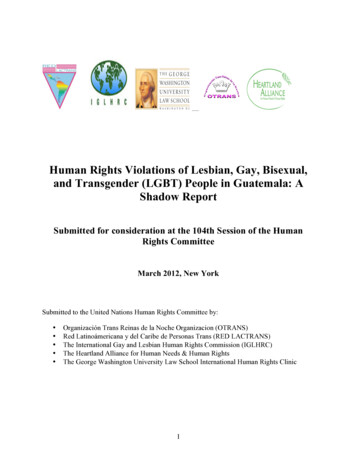
Transcription
Human Rights Violations of Lesbian, Gay, Bisexual,and Transgender (LGBT) People in Guatemala: AShadow ReportSubmitted for consideration at the 104th Session of the HumanRights CommitteeMarch 2012, New YorkSubmitted to the United Nations Human Rights Committee by: Organización Trans Reinas de la Noche Organizacion (OTRANS)Red Latinoámericana y del Caribe de Personas Trans (RED LACTRANS)The International Gay and Lesbian Human Rights Commission (IGLHRC)The Heartland Alliance for Human Needs & Human RightsThe George Washington University Law School International Human Rights Clinic1
Table of ContentsTable of Contents . . . . . . . . . . . . . . . . . . . . . . . . . . . . . . . . . . . . . . . . . . . . . . . . . . .2Executive Summary . . . . . . . . . . . . . . . . . . . . . . . . . . . . . . . . . . . . . . . . . . . . .3Introduction . . . . . . . . . . . . . . . . . . . . . . . . . . . . . . . . . . . . . . . . . . . . . . . . . . . . . . .5Background.7Sexual Orientation and Gender Identity .7Strong Pattern of Generalized Violence and Human Rights Offenses in Guatemala .8Lack of Reporting and Recording 8Substantive Violations .10Articles 2 and 26 (Discrimination) . . . . . . .10Article 3 (Equality between men and women) . . .13Article 6 (Right to Life) . . . . . . . . . . . . . . . . . . . . . . . . . . .15Articles 7, 9 and 10 (Prohibition of Torture and Cruel, Inhuman or Degrading Treatmentor Punishment; Right to Liberty and Security of Persons; and Treatment of PersonsDeprived of Liberty) .16Article 14 (Right to a Fair Trial and Impartiality of the Judiciary) . .18Articles 16 and 17 (Legal Personhood and Right to Privacy) .20Article 19 (Freedom of Opinion and Expression) 22Articles 21 and 22 (Freedom of Assembly and Association . .23Article 23 (Family Life) .23Article 24 (Special Protection of Children) .24Recommendations .262
EXCUTIVE SUMMARYThis report is a joint submission by Organización Trans Reinas de la Noche (OTRANS), RedLatinoamericana y del Caribe de Personas Trans (RED LACTRANS), the International Gay andLesbian Human Rights Committee (IGLHRC), the Heartland Alliance for Human Needs andHuman Rights, and the George Washington University Law School International Human RightsClinic to the United Nations (UN) Human Rights Committee (“HRC” or “the Committee”) onthe occasion of its consideration of the State of Guatemala’s implementation of the InternationalCovenant on Civil and Political Rights (“the Covenant” or “the ICCPR”) at the 104th sessiontaking place in New York City, USA, on 19th and 20th March 2012.1The purpose of this report is to highlight the widespread and systematic human rights violationsexperienced by lesbian, gay, bisexual and transgender (LGBT) individuals in Guatemala. Inparticular, the report draws the attention of the Committee to the following breaches of theCovenant: Individuals in Guatemala are subject to discrimination on the basis of their sexualorientation and/or gender identity by both State and non-State actors, including in accessto healthcare and education services.Though inadequate reporting makes exact numbers uncertain, it is clear that there arepersistent violations of the right to life of LGBT persons in Guatemala on the basis oftheir sexual orientation and/or gender identity. Transgender women may be particularlyat risk. In some instances, the State has been responsible for the extrajudicial killings ofLGBT individuals.The Guatemalan State fails to adequately prevent, to investigate and/or to prosecuteincidents of gender-based violence and killings, including against LGBT individuals.LGBT persons suffer cruel, inhuman and degrading treatment, including a constantthreat of violence that amounts to torture, forced disappearances, sexual violence indetention centres and non-consensual medical testing.LGBT people in Guatemala are denied the right to a fair trial. Judges may refuse to hearcontroversial cases concerning rights violations based on sexual orientation and genderidentity because they fear public reprisal.The Guatemalan State refuses to recognize the gender identity of transgender persons.By denying transgender individuals appropriate identity documents, the State withholdsfrom them the status of legal personhood.1This report was authored by Timothy Merlo (J.D. 2012, The George Washington University Law School), andSupraja Murali (J.D. 2012, The George Washington University Law School) under the supervision of ProfessorShana Tabak of the George Washington University Law School International Human Rights Clinic. The report wasguided and edited by Stefano Fabeni (Heartland Alliance for Human Needs & Human Rights, Director of GlobalInitiative for Sexuality and Human Rights), Marcelo Ferreyra, (International Gay and Lesbian Human RightsCommission, Program Coordinator, Latin America and the Caribbean), Peter Dunne (International Gay and LesbianHuman Rights Commission), Jessica Stern (International Gay and Lesbian Human Rights Commission) and MarcelaRomero (Red Latinoámericana y del Caribe de Personas Trans, Coordinator). Special thanks to the numerousGuatemalan and international activists and civil society organizations who contributed valuable information, reports,and comments throughout the drafting of this report.3
Human rights defenders who advocate for the rights of LGBT persons in Guatemala aresubject to threats, harassment, abuse and, in extreme cases, physical violence by bothstate and non-state actors.Guatemalan law violates the rights of existing LGBT families and prevents other LGBTpersons from founding a family because of their sexual orientation and/or genderidentity.The various rights violations referred to above are each exacerbated by the absence of systematicreporting and recording. The former U.N. Special Rapporteur on Extrajudicial, Summary orArbitrary executions has noted that “structural changes in security and justice [in Guatemala]have not been put forward, neither to diminish the causes of crime nor to address the social,cultural and economic risk factors of violencee.”2 The failure to provide concrete, disaggregatedstatistics around LGBT violence and discrimination permits the Guatemalan authorities toignore, and sometimes even misrepresent, homophobic and transphobic abuse.The extent, breadth and severity of the State of Guatemala’s human rights violations amount to aclear breach of the terms of the Covenant.2U.N. Special Rapporteur on extrajudicial, summary or arbitrary executions, Philip Alston, Addendum Report onMission to Guatemala of 21-25 August 2006, U.N. Doc. No. A/HRC/4/20/Add.2 (19 February 2007).4
I. INTRODUCTIONThis shadow report on the human rights situation of LGBT people in Guatemala was written andsubmitted through the collaborative efforts of Organización Trans Reinas de la Noche(OTRANS), Red Latinoámericana y del Caribe de Personas Trans (RED LACTRANS), theInternational Gay and Lesbian Human Rights Commission (IGLHRC), the Heartland Alliancefor Human Needs & Human Rights, and The George Washington University Law SchoolInternational Human Rights Clinic.Guatemala became party to the International Covenant on Civil and Political Rights on May 5,1992.3 Guatemala submitted its third report under Article 40 of the ICCPR on March 31, 2010.4This shadow report discusses the human rights situation of LGBT people in Guatemala. TheICCPR guarantees protections to individuals that are guaranteed by the state and must be ensuredin the form of positive and negative binding legal obligations. These rights are guaranteed to allpeople within the state territory or subject to the state’s jurisdiction, regardless of that person’sstatus under domestic law.5Various UN bodies have recently called for States parties to ensure that their laws prohibitdiscrimination on the basis of sex, sexual orientation, and gender identity.6 These calls to actionrepresent an important step for the augmentation of human rights for LGBT individuals, whichthe UN Human Rights Council identified as a key concern when it passed Resolution 17/19,Human rights, sexual orientation, and gender identity, in June 2011.7 Guatemala, then a memberof the Human Rights Council, voted in support of this resolution.8 In practice, however, theGuatemalan State has done little to protect the human rights of sexual minorities.The Human Rights Committee has demonstrated serious concern for the rights of sexualminorities in several other countries. This should be taken as guidance by the government ofGuatemala. In its recent Concluding Observations following its review of Jamaica, theCommittee encouraged Jamaica to take steps to protect individuals from discrimination on thebasis of sexual orientation and gender identity. It stated that Jamaica “should send a clearmessage that it does not tolerate any form of harassment, discrimination or violence againstpersons for their sexual orientation.”9 While the specifics of those concluding observationsfocused on the situation of individuals who identify as homosexual, or, on rights associated with3Status of Ratifications, International Covenant on Civil and Political Rights, available c TREATY&mtdsg no IV-4&chapter 4&lang en4Third Periodic Report of Guatemala, U.N. Doc. No. CCPR/C/GTM/3 (March 31, 2010).5General Comment 31 of the Human Rights Committee, CCPR/C/21/Rev.1/Add.13, at 4¶ 10, May 26, 2004.6Concluding Observations of the Human Rights Committee: Jamaica, 103rd Session, 17 October-4 November 2011,Advance Unedited Version, available at tm7U.N. Human Rights Council, Resolution 17/19, Human rights, sexual orientation and gender identity, U.N. Doc.A/HRC/17/L.9/Rev.1 (June 17, 2011).8U.N. Human Rights Council, Resolution 17/19, Human rights, sexual orientation and gender identity, U.N. Doc.A/HRC/17/L.9/Rev.1 (June 17, 2011).9U.N. Human Rights Committee (HRC), Concluding Observations: Jamaica, 103rd Session, 17 October-4November 2011, Advance Unedited Version, available at tm.5
sexual orientation, the HRC also demonstrated concern about rights associated with genderidentity, as will be discussed below.10Furthermore, during the course of the 2008 Universal Periodic Review Process at the HumanRights Council, Switzerland, Slovenia, and the Czech Republic made recommendations toGuatemala calling attention to the lack of compliance with human rights standards regardingLGBT individuals. These three countries recommended that Guatemala implement measures tocombat discrimination against human rights defenders and others on the basis of sexualorientation and gender identity, and to end impunity for such attacks, including “specificeducation and awareness programmes for law enforcement, judicial and other authorities, withfocus, inter alia, on protection of enjoyment of human rights by persons of minority sexualorientation and gender identity.”11 Despite these calls to action, the Government has taken nosteps to implement these much-needed changes in the intervening years.12Despite the importance of observing and protecting LGBT rights, the State of Guatemala makesno mention of issues faced by the LGBT community in its report to the HRC.13 The State’sfailure to protect these rights results in egregious human rights violations, including violations ofthe right to protection from nondiscrimination, the right to equal treatment of men and women,the right to life, the right to freedom from torture, cruel, inhuman, and degrading treatment, theright to liberty, the right to security of person, the right to a fair trial, the right to legalpersonhood, the right to privacy, the right to freedom of expression, the right to freedom ofassociation, the right to a family life, and the rights of children.LGBT abuse in Guatemala is all the more surprising as, according to the recent National Plan ofHuman Rights: 2007-2017 (published by the Presidential Commission of Human RightsGuatemala, 2007) there is a recognition of the “importance of developing a social culture oftolerance, of respect of difference to create and promote public policies that allow theintegration and acceptance of people of diverse sexual orientation in society.”10Concluding Observations: Jamaica, supra at ¶ 8. (“The state should amend its laws with a view to prohibitingdiscrimination on the basis of sex, sexual orientation, and gender identity”).11U.N. Human Rights Council, Report of the Working Group on the Universal Periodic Review: Guatemala, pp. 17,19, U.N. Doc. No. A/HRC/8/38 (May 29, 2008).12Interview with Anonymous Sources, in Washington, D.C. (October 28, 2011). On file with George WashingtonUniversity Law School International Human Rights Clinic.13Third Periodic Report of Guatemala, supra note 4.6
II. BACKGROUNDA. Sexual Orientation and Gender IdentitySexual orientation refers to “each person’s capacity for profound emotional, affectional andsexual attraction to, and intimate and sexual relations with, individuals of a different gender orthe same gender or more than one gender.”14 This term includes lesbian, gay, bisexual, orheterosexual (straight) orientations.15Gender identity refers to[E]ach person’s deeply felt internal and individual experience of gender, whichmay or may not correspond with the sex assigned at birth, including the personalsense of the body (which may involve, if freely chosen, modification of bodilyappearance or function by medical, surgical or other means) and other expressionsof gender, including dress, speech and mannerisms.16The external manifestation of a person’s gender identity is called gender expression.17 Genderexpression usually involves “masculine,” “feminine,” or gender-variant behavior.18 Transgenderpeople generally seek to make their gender expression match their gender identity, rather thantheir sex at birth.19 In other words, a person whose sex at birth is determined to be male, but whohas an internal sense of being a female, is a transgender woman.Transgender is a term for people whose gender identity and/or gender expression and their sex atbirth do not match.20 This term may include transsexuals, cross-dressers, and other gendervariant people.21 Altering one’s birth sex is not a simple or short process, but rather a processthat occurs over a long period of time known as “transition.”22 Steps that may be, but are notalways, included in transition are: telling one’s family and friends, changing ones name and/orsex on legal documents, hormone therapy, and medical treatment including surgery.23B. Strong Pattern of Generalized Violence and Human Rights Offenses in GuatemalaGuatemala experienced an armed conflict from 1962 to 1996. Even now, years after conflict hasended, the country still suffers from extremely high rates of violence. Recorded killings in14The Yogyakarta Principles: The Application of International Human Rights Law in relation to Sexual Orientationand Gender Identity at 6 FN 1 (March 2007) available at http://www.yogyakartaprinciples.org/principles en.htm15Ibid.16The Gay & Lesbian Alliance against Defamation (GLAAD), Media Reference Guide 7 (8th Edition, May 2010).17GLAAD Media Guide, supra note 16 at 9.18GLAAD Media Guide, supra note 16 at 8.19GLAAD Media Guide, supra note 16 at 8.20GLAAD Media Guide, supra note 16 at 8.21GLAAD Media Guide, supra note 16 at 8.22GLAAD Media Guide, supra note 16 at 9.23GLAAD Media Guide, supra note 16 at 9.7
Guatemala routinely exceed 5,000 per year.24 In fact, in 2010, 4,925 violent deaths wererecorded, including 41 lynchings, as well as 6,132 reports injury as a result of violent attacks.25This general societal violence is intrinsic to the documented, widespread patterns of socialcleansing and lynching.26 Though much of this violence occurs at the hands of privateindividuals, the UN Special Rapporteur on extrajudicial, summary or arbitrary executionsrecommends that the State must take responsibility and take steps to reduce these occurrences.27Within Guatemalan society, minority groups, including LGBT individuals, are subject toparticularly high levels of violence.C. Lack of Reporting and RecordingJustice systems in Guatemala are ineffective largely due to a lack of infrastructure for recordingand reporting crimes, discrimination, and violations of human rights. As described by PhillipAlston, the U.N. Special Rapporteur on extrajudicial, summary or arbitrary executions:Structural changes in security and justice have not been put forward, neither todiminish the causes of crime nor to address the social, cultural and economic riskfactors of violence. Insecurity and impunity affect daily life and generate mistrustand social dissatisfaction. All this is exacerbated by the lack of adequate attentionto victims.28As the systems stand, even where statistics exist, their accuracy is questionable. Statistics thatmay actually reflect hate crimes or discrimination may instead be characterized as reflecting drugtrafficking or gang violence, thereby allowing the government to overlook important societalissues pertaining to the LGBT community.29 In addition to a lack of clarity around the causes ofviolence, in Guatemala the security and justice sectors also lack appropriate methods todisaggregate statistics, which results in unclear statistics that may not accurately portray theimpact of violence in various communities. Furthermore, these statistics, whether accurate ornot, may be misused by the police. Thus, in any individual crime that is documented by thepolice, a record of the crime itself may exist, but numerous important details relevant to theappropriate classification and understanding of what actually transpired, may be missing.Another area in which reporting and recording of statistics fails the LGBT community inGuatemala is in the area of HIV/AIDS infection rates. These statistics reflect infection rates formen who have sex with men (MSM) and for female sex workers, but may or may not accuratelyreflect numbers among the population of transgender women sex workers (who are regarded24U.N. Special Rapporteur on extrajudicial, summary or arbitrary executions, Philip Alston, Addendum Report onMission to Guatemala of 21-25 August 2006, U.N. Doc. No. A/HRC/4/20/Add.2 ¶ 7 (19 February 2007).25U.N. Office of the High Commissioner on Human Rights, Report of the High Commissioner on Human Rights onthe activities of her office in Guatemala, Addendum, p. 6, U.N. Doc. No. A/HRC/16/20/Add.1 (Jan. 26, 2011).26See generally Alston, supra note 24.27Alston, supra note 24 at ¶¶ 7-8.28High Commissioner Addendum, supra note 25 at p. 6.29Anonymous Sources, supra note 12.8
under Guatemalan law as male).30 The lack of accurate statistics makes it difficult to fully callattention to the problems faced by the transgender community in Guatemala.30Telephone Interview with Dr. Tamara Adrian, Partner, Adrian & Adrian, Caracas, Venezuela (November 9,2011).9
III.SUBSTANTIVE VIOLATIONSA. Articles 2 (Nondiscrimination) and 26 (Equality before the Law)Articles 2(1) and 26 of the Covenant provide for the respect, equality, and nondiscrimination ofall individuals on the grounds of, inter alia, race, color, and sex. In the landmark decision ofToonen v Australia in 1994, the Committee found not only that the reference to “sex” in Articles2(1) and 26 must be taken to include sexual orientation, but also that laws which criminalizeconsensual homosexual acts expressly violate the privacy protections of Article 17.31 In the pasttwelve months alone, the Committee has five times called upon states to end the criminalizationof sexual conduct between adults of the same sex.32 Furthermore, it has recommended that atleast two states take positive steps to end national prejudice and discrimination against LGBTpeople.33 In its recent Concluding Observations on Iran at the 103rd Session, the HRCspecifically noted the “harassment” and “persecution” which transgender individuals face andcalled upon the state party to ensure legal protections on the basis of gender identity.34LGBT individuals in Guatemala are subject to discrimination both by State and non-State actors.Recent statistics suggest that homophobia and transphobia remain deeply embedded within thesocial fabric. According to a nationwide survey, 74% of Gautemalans would not vote for ahomosexual political candidate, while 70% believe that homosexuality is a medical condition.Less than 40% of those surveyed stated that they would accept an LGBT family member.35According to a complementary survey of the LGBT community of Guatemala, 72% of LGBTindividuals report experiencing violations of the rights to health, work, and education.36Transgender women in Guatemala report widespread discrimination in terms of their access tohousing. Indeed, so pervasive is the refusal to rent to transgender women that they are oftenforced to live in small, crowded spaces which become one of the only places that these womencan find acceptance.3731Toonen v. Australia, CCPR/C/50/D/488/1992, UN Human Rights Committee (HRC), 4 April 1994, Accessed tml [accessed 28 September 2011].32Human Rights Committee, Concluding Observations: Ethiopia, ¶ 12 (2011) UN Doc. CCPR/C/ETH/CO/1;Human Rights Committee, Concluding Observations: Colombia, ¶ 14 (2010) UN Doc. CCPR/C/TGO/CO/4;Human Rights Committee, Concluding Observations: Jamaica, ¶ 8 (2011) UN Doc. CCPR/C/JAM/CO/3, (AdvanceEdited Version); Human Rights Committee, Concluding Observations: Iran, ¶ 10 (2011) UN Doc.CCPR/C/IRN/CO/3 (Advance Edited Version); Human Rights Committee, Concluding Observations: Kuwait, ¶ 30(2011) UN Doc. CCPR/C/KWT/CO/2 (Advance Edited Version).33Human Rights Committee, Concluding Observations: Mongolia, ¶ 9 (2011) UN Doc CCPR/C/MNG/CO/5;Human Rights Committee, Concluding Observations: Poland, ¶ 8 (2010) UN Doc CCPR/C/POL/CO/6.34Human Rights Committee, Concluding Observations: Iran ¶ 10 (2011) UN CCPR/C/IRN/CO/3.35Unpublished CID-Gallup Survey (on file with George Washington University Law School International HumanRights Clinic).36Colectivo Amigos contra el SIDA, Situacion General de los Derechos Humanos de las Personas Gay, Bisexuales,y Transexuales de las Ciduades Costeras de Guatemala (Accessed at http://www.amigoscontraelsida.net/)37Anonymous sources, supra note 12.10
Through its failure to prevent discrimination and promote equality before the law, theGuatemalan Government fails in its obligation to ensure that LGBT individuals may access: (1)healthcare, (2) education and (3) employment.1. Access to HealthcareThe realization of access to healthcare is closely related to and dependent upon the principle ofnon-discrimination enshrined within the ICCPR.38 Despite the State’s obligation not todiscriminate against any group, for LGBT individuals in Guatemala, access to healthcare isextremely limited. For instance, on two separate occasions in 2011, staff at one of the principlestate hospitals, the Hospital Roosevelt, turned away transgender women seeking basic assistance,declaring that they were ineligible for any medical care at that hospital.39HIV/AIDS remains a serious health concern for the LGBT population in Guatemala. While ratesof infection for the population-at-large decreased by 25% from 2001 to 2009, they continued toincrease for certain “at risk” groups, including MSM, transgender women, and sex workers.40Guatemalan human rights defenders attribute the increasing infection rates among MSM andtransgender women to a multiplicity of factors. First, the lack of comprehensive sexual education(with explicit references to homosexuality and transexuality) leads LGBT individuals to engage,often unknowingly, in risky behavior.41 Second, the rejection of LGBT youth from families andexpulsion from schools means that many enter the labor market at young ages.42 Advocatesallege that without options, sex work becomes essential to the survival of transgender womenand girls.43 Sex workers generally are one of the most-at-risk-populations for HIV infection.44However, advocates allege that the young ages at which transgender girls and young womenenter sex work means that they are often unaware of sexually transmitted infections (STIs) andthe importance of precautionary measures, such as condom use.45 Third, the existence ofpatriarchal structures and expectations mean that gay men and MSM in Guatemala are frequentlyforced to hide their sexuality and enter into heterosexual marriages, often while continuing toengage in extramarital homosexual intercourse.46 Driving gay culture underground creates anenvironment of secrecy and shame that inhibits the right to health. Fourth, the association ofhomosexuality with HIV/AIDS in Guatemala is so widespread that people living with38See Office of the United Nations High Commissioner for Human Rights and World Health Organization, eet31.pdf39“A un Año de 'Desaparición' de Catherine Mishel Barrios, más 30 Mujeres Transexuales asesinadas enGuatemala,” 28th February, 2012. Accessed January 31, 2012 at ad-transexuales-guatemala.htm40Mirva Lempiainen, “In Guatemala, HIV Infections Rise for Women,” The Interdependent, June 6, 2011. AccessedJanuary 31, 2012 at la-hiv-infections-rise-for-women41Anonymous Sources supra 12.42Ibid.43Ibid.44Lempiainen, supra note 40.45Anonymous Sources, supra note 12.46Lempianen, supra note 40.11
HIV/AIDS, including those who are LGBT, frequently conceal their status in order to avoidhomophobic and transphobic discrimination.47In addition to discrimination in access to healthcare generally and HIV/AIDS treatment andprevention specifically, transgender individuals experience discriminatory restrictions inaccessing healthcare fundamental to their well-being: hormone treatment and sex reassignmentsurgery.48 When a transgender person chooses to transition, the refusal of hormone treatment andsex reassignment surgery is a violation of that person’s rights under the Covenant. It may preventthe individual from ever realizing and expression their true identity.2. Access to EducationLGBT individuals in Guatemala experience discrimination in access to education. Guatemalanlaw guarantees access to free primary and secondary education.49 However, because of limitedresources, the current education system cannot meet the total demand, particularly among ruraland indigenous communities.50 In the context of these shortages, children who identify as or areperceived to be LGBT are disproportionately affected.51 Within this group, transgender studentsare particularly vulnerable. Rejected by their families and communities at young ages, advocatesallege that many transgender girls and young women are forced to leave school in order tosupport themselves.52Discrimination against LGBT students is not limited to primary and secondary education; itexists throughout the education system. For example, a transgender student passed the entranceexam at El Instituto Técnico de Capacitación y Productividad (INTECAP), the primary technicaltraining center in Guatemala.53 When the director of INTECAP learned that she was transgender,he told her that the institute’s regulations established that they could not take on students like herbut “only men and women.”54 As a result, she was barred from admission to the school.47Lempianen, supra note 40.“Colectivos de transexuales de Guatemala piden Ley que reconozca derechos y combata la Transfóbia”, (May 28,2011). Accessed January 31, 2012 at ia/.49Article 74 of the Guatemalan Constitution: Citizens have the right and obligation to receive initial education, preschool, primary and basic education, within the age limits established by the law. The education is free. The Stateshall provide for and promote scholarships and educational credits50U.N. Committee on the Rights of the Child, Consideration of reports submitted by states parties under article 44of the Convention on the Rights of the Child; Concluding Observations: Guatemala, ¶ 80, U.N. Doc. No.CRC/C/GTM/CO/3-4 (Oct. 1, 2010).51Anonymous Sources, supra note 12.52Ibid; Interview with Dr. Adrian, supra note 30.53“A un Año ,” supra note 39.54“A un Año ,” supra note 39.4812
3. Access to EmploymentIn recent surveys55 carried out by the rights groups, Organización Trans Reinas de la Noche andRedLacTrans, 22% of transgender women respondents stated that the factor most inhibiting theirsocial inclusion was a lack of access to employment.56 Despite this, transgender womenexperience systematic restrictions in entering the Guatemalan jobs market.According to the results of the survey, 23% of transgender women recalled having sufferedstigma and discrimination in their attempts to find employment. 21% of respondents stated thatthey were certain that they had been denied employment solely on the basis of their genderidentity.57 The lack of legal protections surrounding gender identity, and the fact that the Stateparty does not grant transgender individuals appropriate identity documentation, means thatemployers can disregard transgender applications with relative impunity.58The survey concludes: “Rejection and marginalization, due to gender identity, are key fac
experienced by lesbian, gay, bisexual and transgender (LGBT) individuals in Guatemala. In particular, the report draws the attention of the Committee to the following breaches of the Covenant: Individuals in Guatemala are subject to discrimination on the basis of their sexual orientation and/or gender identity by both State and non-State .
